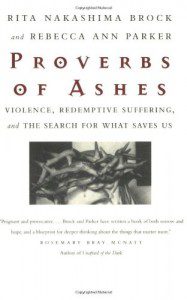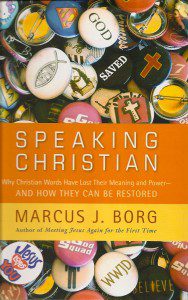For regular readers, with this post I will have finally had a chance to share all my notes from the various events I have attended in recent months. The following are from the one-day Jesus Seminar on the Road workshop back in March in Washington, D.C.
Joanna Dewey
“The Social World of the Roman Empire and its Christian Communities”
Note: Joanna Dewey is the Harvey H. Guthrie, Jr. Professor Emerita of Biblical Studies at the Episcopal Divinity School, Cambridge, Massachusetts. A specialist in the Gospel of Mark, orality studies, and feminist approaches to the New Testament, she is the author of several books, including Mark as Story (with David Rhoads, 1999).
Bernard Scott also presented (see below), but you’ll also see some of his comments on Dewey’s presentation interspersed.
- First century people would’ve heard the would “empire” as no different from what Romans were doing — as in the phrase”kingdom/empire of God.”
- Paul’s “male & female,” “slave & free” was radical in a rigidly hierarchal society (Galatians 3:28).
- Women were largely written out of the New Testament, although the were historically active and present.
- Emperor: all-in-one, as opposed to separate spheres of power: religious (pope), economic (Bill Gates), military (United States), etc.
- Advanced Agrarian society: iron plough
- 3 out of 4 people died before age 5
- Slaves taken for granted, almost invisible like appliances.
- Son owes obedience to father as long as father lives, making Jesus a very disobedient son.
- Thus, it is possible that James is the inspiration for the elder brother in the Parable of the Prodigal Son (Scott), but can’t prove it. Try reading the book of James through that lens!
- Jesus’ family were day laborers because they owned no land. Not “expedables,” but could get there quickly.
- When Spartacus gets free, the first thing he does is get slaves himself. Wanted freedom for himself, but doesn’t question institution (Scott).
- Augustus Caesar: If women ever took after Cleopatra, would be disaster. Woman as “big man.”
- Luke made up story of Jesus reading (would have been illiterate), nor would Nazareth have had an expensive Isaiah scroll!
- Luke includes shepherds as unclean, in contrast to imperial birth narratives (Scott)
- In 17th c. started commenting that natives illerate. Prior was unremarkable. Would only say that natives were noisy.
- Letters (Paul) are used to communicate long distance — then read or performed. No spaces between letters, so can’t read it unless you know it…worked through memory.
- Marriages also oral — no contract unless elite.
- Hire scribe to read and write.
- Writing was, for most, not an economic or social advantage.
- Life is conducted orally and memory is central. [Think about Augustine quoting from memory.]
- We only have that kind of great oral tradition in (some) families. Our living oral culture is TV/film.
- Mark may not have been literate either — any more than Homer was! (minority view)
- Jesus may have spoken Greek because it was the dominant culture (Scott).
Update: I just read a blog post from Bart Ehrman refuting the view that Jesus may have spoken Greek. I have no idea what Scott’s response would be, but here is an excerpt from Ehrman’s post:
For anyone who wants the full documentation, I strongly urge you to read the two books by Mark Chancey on Galilee: Greco-Roman Culture and the Galilee of Jesus and The Myth of a Gentile Galilee. The idea that rural Galilee (where Jesus was raised) was thoroughly Hellenized is a myth. (For related issues of literacy, I also recommend highly the most recent and authoritative study, Catherine Hezser’s, Literacy in Roman Palestine.)
On Jesus and Greek. It is true that Greek was spoken in the major cities of Galilee (all two of them) among the cultured elite. But Jesus was not from a major city and was not a member of the cultured elite. There is no evidence to indicate he ever (EVER!) went to one of the large cities of Galilee (Sepphoris or Tiberius), let alone that he was educated or cultured there, or took language classes at the local high school. Sepphoris is never, ever mentioned in the New Testament. It is not helpful to say that Jesus could / would have walked there from Nazareth. Most lower class rural people then (and now, for that matter, although things are much better since they invented bicycles, motorcycles, trains, and cars) did not travel *at all*. If someone was a common laborer, he worked six days a week. And he had no money for travel. And the one day a week that he could travel, if he was a Jew, because he did not have to work, he could not travel, because it was the Sabbath.
In Nazareth Jesus would have had zero reason to learn Greek, and probably no way to learn Greek. Rural Galilee was completely Jewish (culturally) and thoroughly Aramaic (linguistically). Read Chancey. Even when Jesus was an adult, there is no reference to him visiting a major city (until he goes to Jerusalem at the end of his life), or speaking Greek, or knowing Greek. He was a rural Jew in the Jewish hinterlands of Galilee. He almost certainly could not speak Greek. (His “customers” – if he was in fact a carpenter – or even if he was a stone mason or a blacksmith: the word used of his occupation in Mark 6 – TEKTON – could be any of the above – would have been rural Jews like him, who spoke Aramaic, not Greek speaking urbanites).
- Writing developed in part to facilitate slave trade.
- Mark written at 70…doesn’t mean everyone read it at that time.
- Women get written out because men did the writing.
- See the various versions of Little Red Riding Hood. Was she rescued by a man or did she save herself?!
- A woman annointing Jesus is the proper duty of a prophet. Anointing feet is proper duty of wife or slave.
- Women have only come into biblical scholarship in last 50 years…maybe.
- If we tell repeat the Bible verbatim, we replicate androcentrism.
- We don’t have evidence for slaves around Jesus — not the same as evidence for women. But you wouldn’t bother often to list a slave’s name. Slaves also not free, so perhaps not written out in same way because not included.
- We can assume that Jesus interacted with slaves and slave owners.
- Some slaves baptized with slave owners, whether wanted to or not — and baptism didn’t entail freeing those newly baptized slaves.
- Book Recommendation: Slavery As Moral Problem: In the Early Church and Today by Jennifer A. Glancy:
The fact that some early Christians were slaves does not present a moral problem for Christians today. The fact that some early Christians were slaveholders does. Jennifer Glancy tackles questions that continue to haunt contemporary men and women, inside and outside of the churches: Why didn’t Jesus speak out forcefully against slavery? Why didn’t the early church see slavery as fundamentally incompatible with the gospel? Were there any bright moments when some Christians in fact drew that conclusion, and why don t we know more about them? Why didn’t Christianity have more of an impact on slaveholding in the Roman Empire? And what lessons can we learn as we face moral catastrophes in our own day? Though chapters discuss slavery in the first centuries of the church, Glancy’s focus is on the question of moral imagination: What does it take for people to take a clear stand against entrenched and accepted wrong? In an age when debt bondage, child labor, sex slavery, and human trafficking are increasing and increasingly integrated into economic globalization, what should our response be? And do early Christian writings provide any help at all?
Five Factors leading to re-subordination of women
- Natural process of institutionalization (see de-volution of Communist Revolution, Pentecostalism)
- from House churches (“proper sphere of women” so easier to take leadership) into public space (traditional male space)
- Oral to written: power of written authority (written by men)
- re-introduction of sacrifice: understanding of the Eucharist as sacrifice (men make sacrifice, not women)…vs. if had stayed as full meal.
- Trump card: Constantine.
NOTE: Schussler-Fiorenza has convinced me that we should be wary of confusing Jesus as savior with “building the kingdom of God” (or better: “building the Beloved Community” which was his — and God’s — larger point). Here’s one quote:
Feminist studies have shown that androcentric languages and cultures not only place elite Man in the center of historical scientific discourses but also relegate wo/men to the margins or silently pass them over altogether. Hence wo/men belong to the ‘disappeared’ in history. A reconstruction of the Historical-Jesus that sees him as a great charismatic leader and heroic or divine man therefore reinforces the ideological power of androcentrism and the immasculation (Judith Getterly) of wo/men. Even if it concedes that wo/men were disciples of Jesus, it still does not break through the linguistic-cultural androcentric or, better, kyriocentic (lord/master/father/husband-centered) framework of Historical-Jesus studies insofar as it still places Jesus, the charismatic male leader, into the center and positions wo/men in relation to him.”
(“Tablesharing and the Celebration of the Eucharist.” In “Can We Always Celebrate the Eucharist?” p. 11-12).
Bernard Brandon Scott
“Imperial Images in Stone and Song”
Bernard Brandon Scott is the author of several books, including Hear Then the Parable, and the editor of several more. A charter member of the Jesus Seminar, he is co-chair of the Bible in Ancient and Modern Media Section of the Society of Biblical Literature and a consultant to the American Bible Society experimental film translations. In recognition of that work, the American Bible Society Research Center awarded him a research grant for 1999–2000 to work on sound mapping, the study of sound as the communication environment of the ancient world.
- Ancient literacy
- 10% Urban area
- Cicero: read, but not write
- 2-3% Rural Areas (Q and Mark could be the result of this level of “village scribe”)
- Pubicatio…dissertation: out loud, not written
- Name: Octavian, “August one”; Augustine is title: “divine one”
- Julius was ‘god’ so Augstus is “son of God”…adopted, foretold by comet
- Jesus adopted son…foretold by star.
- Carvings on Arc in Rome: spoils (rape and pillage) depicted….Pax Romana via VIOLENCE of Rome.
- This depiction of Rome’s force and triumph is on coins EVERYWHERE…Gospels written in wake of this threat of violence.
- Usually Romans REBUILT Temples that they destroyed…but GRANDER and with their gods. But didn’t with Jerusalem Temple (tired of their revolts).
- When ancients think of “Son of god,” they think Augustus…see that statue.
- With CONSTANTINE, cross became central image, and Paul was then misread through that Constantinian lens.
- The orans prayer position is ROMAN…pentecostal and Roman Catholic Church is copying Rome, even if unconsciously.
- Worship is bending knee — see Jewish davening.
- Q is lost. That’s what should have happened to Mark, especially because so much of Mark is incorporated into Matthew.
The Rev. Dr. Carl Gregg is a trained spiritual director, a D.Min. graduate of San Francisco Theological Seminary, and the pastor of Broadview Church in Chesapeake Beach, Maryland. On July 9, 2012, he will start as the Minister of the Unitarian Universalist Congregation of Frederick, Maryland. Follow him on Facebook (facebook.com/carlgregg) and Twitter (@carlgregg).
















